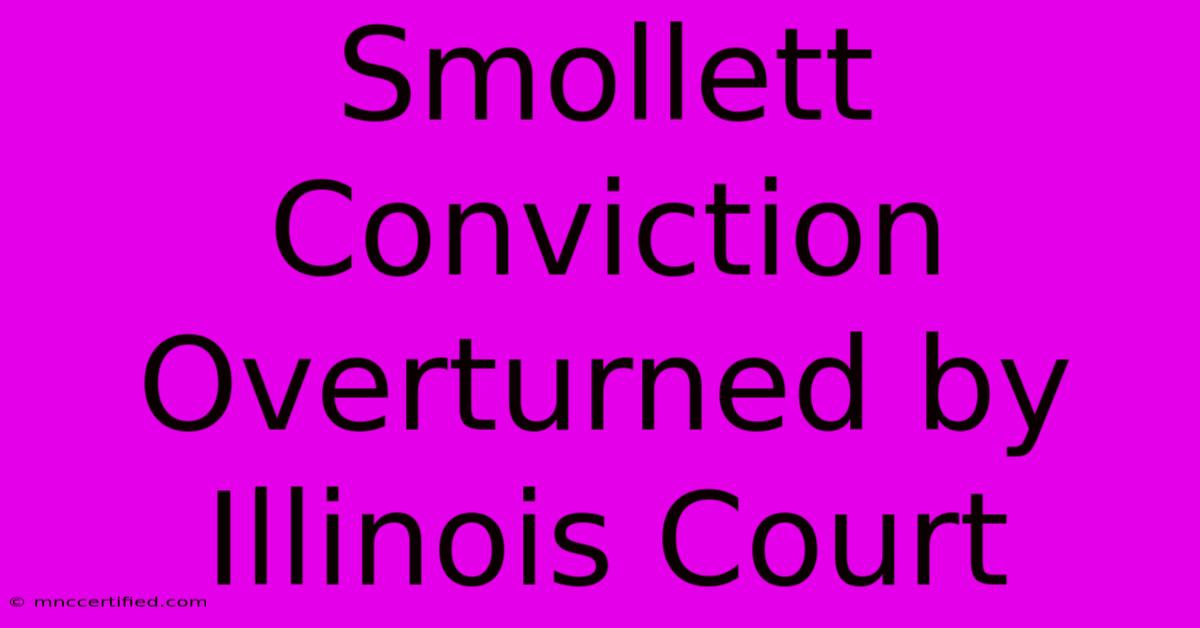Smollett Conviction Overturned By Illinois Court

Table of Contents
Smollett Conviction Overturned: A Deep Dive into the Illinois Court Decision
The high-profile case of Jussie Smollett, the actor accused of staging a hate crime, took another dramatic turn when an Illinois appellate court overturned his conviction. This decision has sent shockwaves through the legal community and reignited intense public debate. This article delves into the details of the court's ruling, exploring its implications and the ongoing controversy surrounding the case.
Understanding the Original Charges and Conviction
In 2019, Smollett reported to Chicago police that he had been the victim of a racist and homophobic attack. He claimed two masked men had shouted racial and homophobic slurs, poured bleach on him, and placed a noose around his neck. This incident garnered significant media attention and sparked widespread outrage.
However, after a thorough investigation, Chicago police determined that Smollett had orchestrated the entire incident himself. He was subsequently charged with disorderly conduct for filing a false police report. After a highly publicized trial, he was found guilty on five of the six counts against him and sentenced to 150 days in jail, followed by probation and community service. This conviction, however, was not the end of the story.
The Appellate Court's Decision: Why the Conviction Was Overturned
The Illinois Appellate Court overturned Smollett's conviction on grounds of procedural error. The court focused heavily on the process by which the special prosecutor, Dan Webb, was appointed. They argued that the process lacked sufficient authorization under Illinois law, rendering the entire prosecution invalid. This technicality, while seemingly minor, ultimately proved decisive.
The court's ruling didn't address the merits of Smollett's guilt or innocence. Instead, it centered on a critical flaw in the prosecution's legal standing. The judges deemed the appointment of Webb to be a violation of due process, impacting the legitimacy of the entire legal proceedings. This legal technicality resulted in the vacating of Smollett's conviction. This highlights the importance of strict adherence to legal procedure even in high-profile cases.
Key Arguments in the Appellate Court's Ruling:
- Lack of proper authority: The court found the process by which the special prosecutor was appointed didn't comply with Illinois law.
- Due process violations: The improper appointment was seen as a violation of Smollett's right to due process.
- Focus on procedure, not guilt: The court explicitly stated its decision didn't comment on Smollett's guilt or innocence, focusing solely on the procedural irregularities.
Implications and Public Reaction
The overturning of Smollett's conviction has sparked fierce debate. Many believe the decision undermines the integrity of the justice system and sends a troubling message about accountability for false reporting. Others argue the court correctly focused on upholding procedural law, regardless of the public perception of Smollett's guilt.
The ruling raises important questions about:
- The balance between procedural fairness and achieving justice: The case underscores the complexities of the legal system and the potential conflicts between procedural correctness and perceived justice.
- The impact of public opinion on legal proceedings: The intense media coverage surrounding the case undoubtedly influenced public perception and fueled heated discussions.
- The role of special prosecutors: The decision may lead to increased scrutiny of the appointment process for special prosecutors in the future.
SEO Considerations and Keywords
This article targets several relevant keywords, including: "Jussie Smollett," "Smollett conviction overturned," "Illinois Appellate Court," "false police report," "special prosecutor," "due process," "procedural error," "hate crime hoax." These keywords are naturally integrated throughout the text, optimizing the article for search engines while maintaining readability. Further off-page SEO strategies would involve promoting this article through social media sharing, backlinks from relevant news sites, and engagement within online legal communities.
Conclusion: A Case Far From Over
The overturning of Jussie Smollett's conviction is not the final chapter in this complex saga. While the appellate court's decision is legally binding, it leaves many lingering questions and continues to fuel public discourse on justice, due process, and the complexities of high-profile cases. The impact of this decision will likely be felt for years to come, influencing future legal interpretations and practices.

Thank you for visiting our website wich cover about Smollett Conviction Overturned By Illinois Court. We hope the information provided has been useful to you. Feel free to contact us if you have any questions or need further assistance. See you next time and dont miss to bookmark.
Featured Posts
-
Golf Course Investment Companies
Nov 22, 2024
-
Rooneys Absence Coleens I M A Celeb
Nov 22, 2024
-
Sample Insurance Adjuster Resume
Nov 22, 2024
-
Urgent Evacuation Gatwick Airport Security Breach
Nov 22, 2024
-
Week 13 Bengals Stars Win Guarantee
Nov 22, 2024